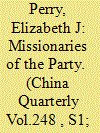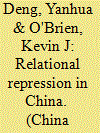| Srl | Item |
| 1 |
ID:
181926


|
|
|
|
|
| Summary/Abstract |
Among the most distinctive features of Chinese Communist Party governance is the frequent deployment of work teams to conduct campaigns, implement policies and troubleshoot crises. An underappreciated aspect of work-team operations from Land Reform to the present has been the active participation of educated intellectuals as key intermediaries between central leaders and grassroots society. Serving in effect as “missionaries” of the Party, intellectual work-team members function as trained “ritual specialists” in carrying out their appointed mission. Although work teams are often not the most efficient or effective means of governance, the impact of work-team experience on team members themselves is consequential. Employing quasi-religious practices designed to promote the ideological incorporation of intellectuals, work teams have helped to forestall the emergence in China of an alienated class of dissidents like those whose criticisms eroded the legitimacy of Communist regimes elsewhere in the world.
|
|
|
|
|
|
|
|
|
|
|
|
|
|
|
|
| 2 |
ID:
124639


|
|
|
|
|
| Publication |
2013.
|
| Summary/Abstract |
Chinese local officials frequently employ relational repression to demobilize protesters. When popular action occurs, they investigate activists' social ties, locate individuals who might be willing to help stop the protest, assemble a work team and dispatch it to conduct thought work. Work team members are then expected to use their personal influence to persuade relatives, friends and fellow townspeople to stand down. Those who fail are subject to punishment, including suspension of salary, removal from office and prosecution. Relational repression sometimes works. When local authorities have considerable say over work team members and bonds with protesters are strong, relational repression can help demobilize protesters and halt popular action. Even if relational repression does not end a protest entirely, it can limit its length and scope by reducing tension at times of high strain and providing a channel for negotiation. Often, however, as in a 2005 environmental protest in Zhejiang, insufficiently tight ties and limited concern about consequences creates a commitment deficit, partly because thought workers recognize their ineffectiveness with many protesters and partly because they anticipate little or no punishment for failing to demobilize anyone other than a close relative. The practice and effectiveness of relational, "soft" repression in China casts light on how social ties can demobilize as well as mobilize contention and ways in which state and social power can be combined to serve state ends.
|
|
|
|
|
|
|
|
|
|
|
|
|
|
|
|